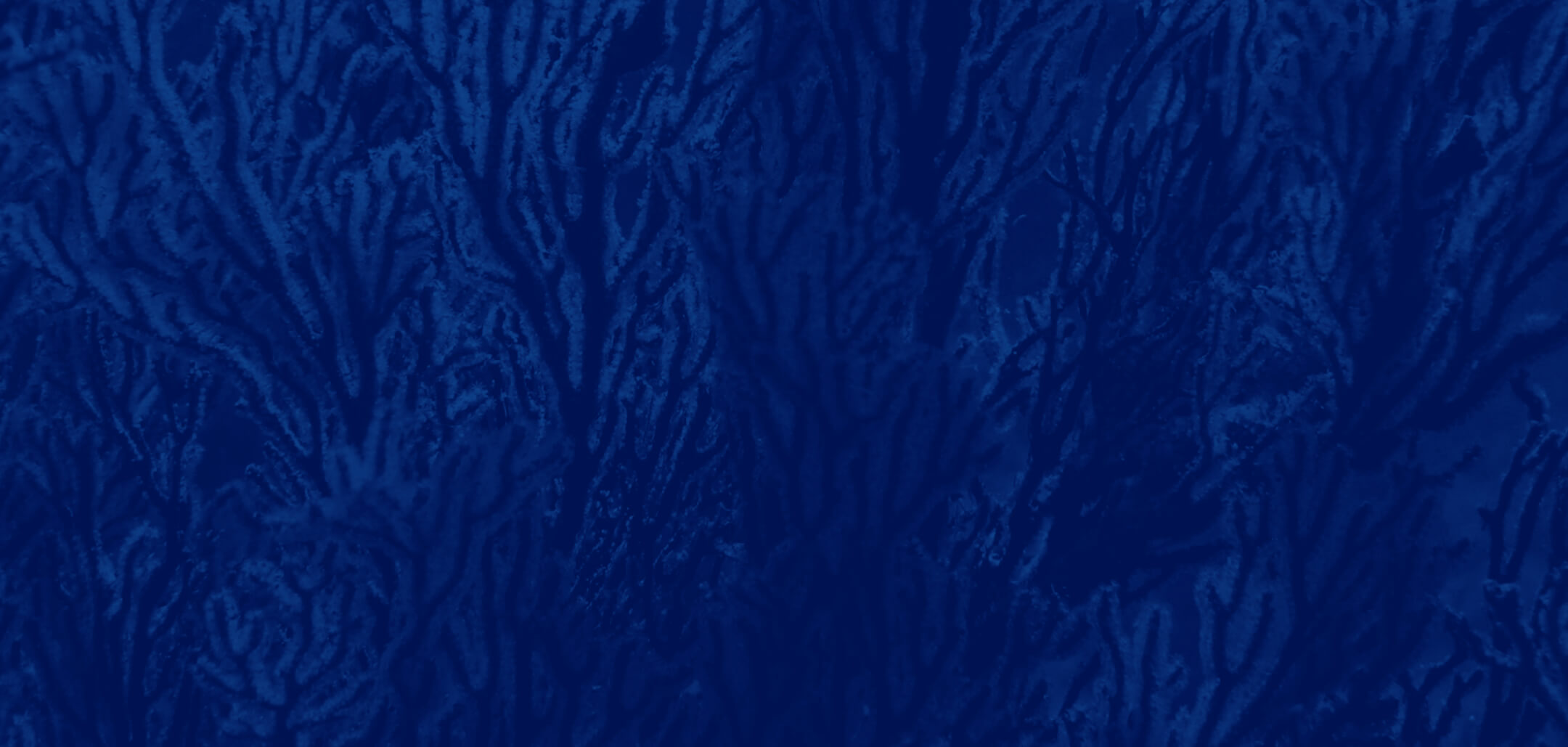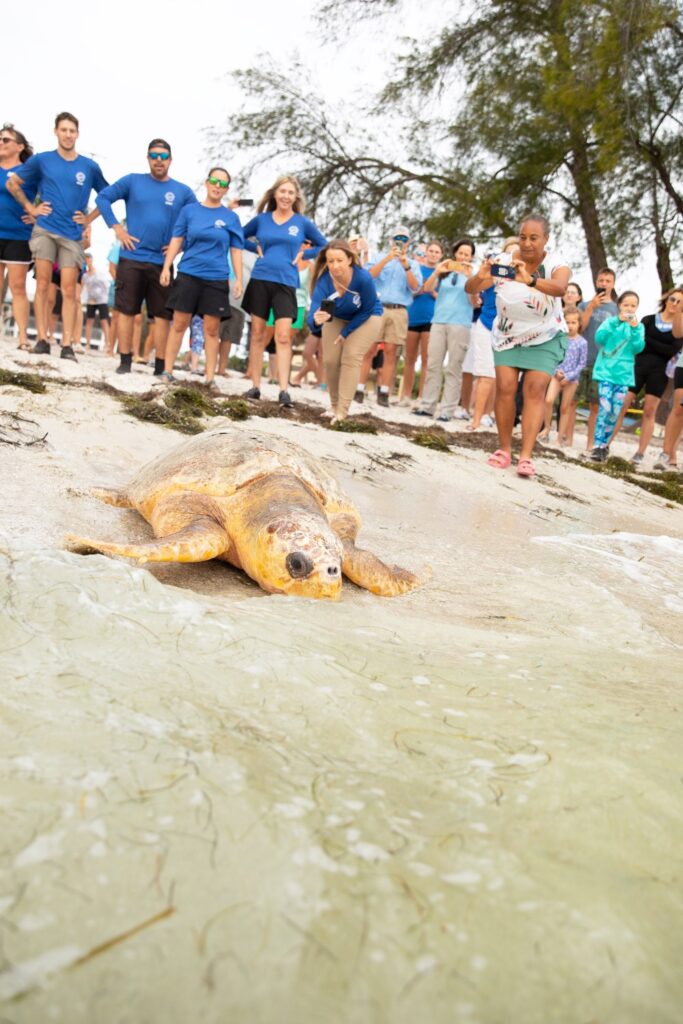Mote Marine Laboratory and The Florida Aquarium are thrilled to announce the release of two rescued loggerhead sea turtles nicknamed, “Valerie” and “Mahomes,” at Anna Maria Bayfront Park Tuesday morning, May 30.
This momentous event marks the finish line of months of dedicated care and rehabilitation provided by Mote’s Sea Turtle Rehabilitation Hospital and The Florida Aquarium Turtle Rehabilitation Center.
“We are proud to collaborate with The Florida Aquarium in our shared mission to rescue and rehabilitate sea turtles,” said Lynne Byrd, Mote’s Rehabilitation and Medical Care Coordinator. “By combining our expertise and resources, we can provide these magnificent creatures with the best possible care, ensuring their recovery and return to the big blue.”
“Valerie” was discovered floating nearshore on Longboat Key, and initial observations suggested the turtle was affected by toxins from red tide. She was transported to Mote’s Sea Turtle Rehabilitation Hospital on Feb. 21 and began receiving injectable antibiotics and subcutaneous fluids until symptoms improved. When “Valerie” arrived at the hospital, Mote scientists found that she already had a flipper tag and a passive integrated transponder (PIT) tag. The PIT tag, placed by Mote’s Sea Turtle Conservation & Research Program in 2019, gives the turtle a unique barcode identification number that allows our scientists to gain valuable insights into “Valerie’s” migratory patterns, growth rates, survival, and reproductive output.
Similarly, “Mahomes” was found washed ashore off Casey Key Road in Sarasota County and showed symptoms of red tide toxicity. Initially admitted to Mote’s Sea Turtle Rehabilitation Hospital on Feb. 13, “Mahomes” was later transferred to Mote’s nearby neighbors at The Florida Aquarium Turtle Rehabilitation Center on Feb. 24 to better prepare Mote for the high numbers of incoming sea turtle patients affected by toxic red tide exposure. Requiring similar treatment, “Mahomes” received antibiotics and supportive care during the course of rehabilitation at The Florida Aquarium to help rid the sea turtle’s body of toxins. Before the release, “Mahomes” was outfitted with a satellite tag by The Florida Aquarium and the Sea Turtle Conservancy. These tags provide critically important information about diving, feeding, migratory and activity patterns all while recording corresponding environmental data such as water temperatures. This data help better understand the patient’s behavior after reintroduction and provides key insight for future rehabilitation and conservation efforts.
Under the meticulous care of both facilities’ dedicated staff members, “Valerie” and “Mahomes” have made remarkable recoveries, successfully clearing all health assessments mandated by wildlife officials and were cleared for release.
“Every turtle matters, as they serve as ambassadors for the critical need to protect and conserve these creatures and the habitats they rely on,” said Byrd. “Every rehabilitated sea turtle is a symbol of hope for the future of our oceans.”
Within Sarasota or Manatee county waters, if you see a stranded or dead sea turtle, dolphin or whale, please call Mote’s Stranding Investigations Program, a 24-hour response service, at 941-988-0212.
If you see a stranded or dead manatee anywhere in state waters or a stranded or dead sea turtle, dolphin or whale outside of Sarasota or Manatee counties, please call the FWC Wildlife Alert hotline at 1 (888) 404-FWCC (3922).
Mote’s sea turtle activities are conducted under Florida Fish and Wildlife Conservation Commission Marine Turtle Permits 155, 216, 027, 054, 070, 048, 126 and 028.
About Mote Marine Laboratory & Aquarium:
Mote Marine Laboratory & Aquarium is an independent, nonprofit, 501(c)3 research institution founded in 1955. Mote began and flourished through the passion of a single researcher, Dr. Eugenie Clark, her partnership with the community and philanthropic support, first of the Vanderbilt family and later of the William R. Mote family.
Today, Mote is based in Sarasota, Florida, with five campuses stretching from Sarasota to the Florida Keys. Mote has more than 20 world-class research programs studying oceans locally to internationally, with an emphasis on conservation and sustainable use of marine resources. Mote’s vision includes positively impacting public policy through science-based outreach and education. Showcasing the Lab’s research is Mote Aquarium, open from 10 a.m. to 5 p.m. 365 days a year. Learn more at mote.org.
About The Florida Aquarium:
The Florida Aquarium actively participates in and promotes stewardship of the natural environment as part of our mission of conservation. As a 501(c)(3) not-for-profit organization, The Florida Aquarium provides an opportunity to see over 8,000 aquatic and terrestrial animals, explore complex ecosystems, look for wild dolphins in Tampa Bay, play at the Splash Pad and more! Ranked #2 Aquarium in North America in a recent USA TODAY’S 10Best Readers’ Choice Awards, the aquarium is more than a must-see attraction, The Florida Aquarium is working to protect and restore our blue planet on many conservation fronts, including research and rescue efforts that help restore Florida’s sea turtle and coral populations and to ensure that sharks continue to swim our seas. In August of 2019, The Florida Aquarium, in partnership with Project Coral, became the first to successfully spawn critically endangered pillar coral in a laboratory. To learn more, follow us on social media at @floridaaquarium and visit www.flaquarium.org.


